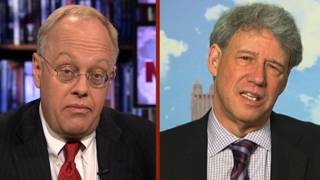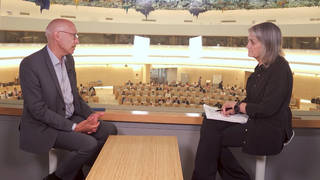
Guests
- Edward SnowdenNSA leaker interviewed by Glenn Greenwald of The Guardian newspaper. The interview was shot by Laura Poitras.
The National Security Agency whistleblower Edward Snowden has been given permission leave the Moscow airport where he has been stranded for over a month. Snowden applied for temporary asylum in Russia last week after the the Obama administration revoked his passport, leaving him unable to travel to Latin America where he has received offers of asylum. Russian authorities have now granted Snowden provisional authorization to enter Russia while his bid is reviewed, a process that could take up to three months. In an hour-long special on whistleblowers, we begin with an excerpt of the June interview in which Snowden came forward as the source behind the recent disclosures of widespread warrantless NSA surveillance of phone and Internet data within the United States and around the world.
Transcript
AMY GOODMAN: Today, we air a special on whistleblowers and leaks. When Edward Snowden came forward in June as the man who leaked details about the National Security Agency’s secret programs to spy on Americans and the world, he was praised by the country’s best-known whistleblower, Daniel Ellsberg, who leaked the Pentagon Papers, the secret history of the Vietnam War. Ellsberg said, quote, “I think there has not been a more significant or helpful leak out or unauthorized disclosure in American history ever than what Edward Snowden shared with The Guardian about the NSA—and that definitely includes the Pentagon Papers,” Ellsberg said.
In a moment, we’ll hear Daniel Ellsberg share a remarkable story about how he leaked the Pentagon Papers. But first I want to turn to Edward Snowden in his own words. This is the interview he did in June with Glenn Greenwald of The Guardian newspaper. It was filmed by Laura Poitras.
EDWARD SNOWDEN: My name’s Ed Snowden. I am 29 years old. I work for Booz Allen Hamilton as an infrastructure analyst for NSA in Hawaii.
GLENN GREENWALD: What are some of the positions that you held previously within the intelligence community?
EDWARD SNOWDEN: I have been a systems engineer, systems administrator, a senior adviser for the Central Intelligence Agency, a solutions consultant and a telecommunications information systems officer.
GLENN GREENWALD: One of the things people are going to be most interested in, in trying to understand what—who you are and what you’re thinking, is there came some point in time when you crossed this line of thinking about being a whistleblower to making the choice to actually become a whistleblower. Walk people through that decision-making process.
EDWARD SNOWDEN: When your in positions of privileged access, like a systems administrator for these sort of the intelligence community agencies, you’re exposed to a lot more information on a broader scale than the average employee, and because of that, you see things that may be disturbing. But over the course of a normal person’s career, you’d only see one or two of these instances. When you see everything, you see them on a more frequent basis, and you recognize that some of these things are actually abuses. And when you talk to people about them in a place like this, where this is the normal state of business, people tend not to take them very seriously and, you know, move on from them. But over time that awareness of wrongdoing sort of builds up, and you feel compelled to talk about it. And the more you talk about it, the more you’re ignored, the more you’re told it’s not a problem, until eventually you realize that these things need to be determined by the public, not by somebody who was simply hired by the government.
GLENN GREENWALD: Talk a little bit about how the American surveillance state actually functions. Does it target the actions of Americans?
EDWARD SNOWDEN: NSA and the intelligence community, in general, is focused on getting intelligence wherever it can, by any means possible, that it believes, on the grounds of sort of a self-certification, that they serve the national interest. Originally, we saw that focus very narrowly tailored as foreign intelligence gathered overseas. Now, increasingly, we see that it’s happening domestically. And to do that, they—the NSA specifically targets the communications of everyone. It ingests them by default. It collects them in its system, and it filters them, and it analyzes them, and it measures them, and it stores them for periods of time, simply because that’s the easiest, most efficient and most valuable way to achieve these ends. So while they may be intending to target someone associated with a foreign government or someone that they suspect of terrorism, they’re collecting your communications to do so. Any analyst at any time can target anyone, any selector anywhere. Where those communications will be picked up depends on the range of the sensor networks and the authorities that that analyst is empowered with. Not all analysts have the ability to target everything. But I, sitting at my desk, certainly had the authorities to wiretap anyone, from you or your accountant to a federal judge, to even the president, if I had a personal email.
GLENN GREENWALD: One of the extraordinary parts about this episode is that usually whistleblowers do what they do anonymously and take steps to remain anonymous for as long as they can, which they hope, often, is forever. You, on the other hand, have this attitude of the opposite, which is to declare yourself openly as the person behind these disclosures. Why did you choose to do that?
EDWARD SNOWDEN: I think that the public is owed an explanation of the motivations behind the people who make these disclosures that are outside of the democratic model. When you are subverting the power of government, that that’s a fundamentally dangerous thing to democracy. And if you do that in secret consistently, you know, as the government does when it wants to benefit from a secret action that it took, it will kind of get its officials a mandate to go, “Hey, you know, tell the press about this thing and that thing, so the public is on our side.” But they rarely, if ever, do that when an abuse occurs. That falls to individual citizens. But they’re typically maligned. You know, it becomes a thing of these people are against the country, they’re against the government. But I’m not. I’m no different from anybody else. I don’t have special skills. I’m just another guy who sits there, day to day, in the office, watches what happening—what’s happening, and goes, “This is something that’s not our place to decide. The public needs to decide whether these programs and policies are right or wrong.” And I’m willing to go on the record to defend the authenticity of them and say, “I didn’t change these. I didn’t modify the story. This is the truth. This is what’s happening. You should decide whether we need to be doing this.”
GLENN GREENWALD: Have you given thought to what it is that the U.S. government’s response to your conduct is in terms of what they might say about you, how they might try to depict to, what they might try to do to you?
EDWARD SNOWDEN: Yeah, I could be, you know, rendered by the CIA. I could have people come after me or any of their third-party partners. You know, they work closely with a number of other nations. Or, you know, they could pay off the triads or, you know, any—any of their agents or assets. We’ve got a CIA station just up the road in the consulate here in Hong Kong, and I’m sure they’re going to be very busy for the next week. And that’s a fear I’ll live under for the rest of my life, however long that happens to be. You can’t come forward against the world’s most powerful intelligence agencies and be completely free from risk.
AMY GOODMAN: Edward Snowden, explaining why he blew the whistle on the National Security Agency.












Media Options